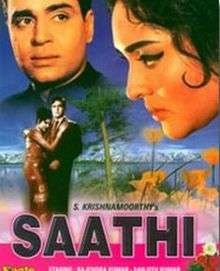Saathi
| Saathi | |
|---|---|
 | |
| Directed by | C. V. Sridhar |
| Produced by |
S. Krishnamurthy (producer) T. Govindarajan |
| Written by |
C. V. Sridhar (story) Raj Baldev Raj (dialogue director) Abrar Alvi (dialogue) |
| Starring |
Vyjayanthimala Rajendra Kumar Simi Garewal Pahari Sanyal |
| Music by | Naushad |
| Cinematography | Marcus Bartley |
| Edited by | N. M. Shankar |
| Distributed by | Venus Pictures |
Release dates | 1968 |
| Country | India |
| Language | Hindi |
| Box office | ₹1,76,00,000 |
Saathi (Hindi: साथी ) is a 1968 Hindi Romantic drama film written and directed by C. V. Sridhar. The film starred Vyjayanthimala and Rajendra Kumar in the lead with Simi Garewal, Pahari Sanyal, David Abraham Cheulkar, Veena and Ram Mohan as the ensemble cast while prominent actors such as Shashi Kapoor, Nanda, Sanjeev Kumar, Shabnam, D.K. Sapru and Pratima Devi done a guest appearance. The film was produced by S. Krishnamurthy and T. Govindarajan of Venus Pictures. The film's score was composed by Naushad with lyrics were provided by Majrooh Sultanpuri edited by N. M. Shankar and was filmed by Marcus Bartley. Saathi is a triangular love story among Ravi, Shanti and Rajni. The film was a remake of 1961 Tamil film Palum Pazhamum which was directed by A. Bhimsingh and starred by Sivaji Ganesan, B. Saroja Devi and Sowcar Janaki.
Plot
Dr. Ravi returns from abroad and takes up position as Chief Surgeon in a hospital. He then meets with Nurse Shanti, who lives an impoverished lifestyle with her ailing mother, and decides to perform surgery, but she passes away, and a guilt-ridden Ravi marries Shanti much to the chagrin of his mentor, Kaka, who had hoped that he would marry his daughter, Rajni. The couple then travel to Kashmir for their honey-moon, and then settle down to a harmonious relationship. Hoping to travel even more, their plans are interrupted by the hospital's head doctor, who wants Ravi to focus on cancer research. The couple drop all travel plans and immerse themselves in research so much so that Shanti herself becomes ill, and not wanting to become a burden, leaves. A frantic Ravi searches high and low in vain, and is subsequently devastated to learn that she has perished in a train accident. Kaka then becomes very ill and Kaki tells Ravi that the cause of his illness is Rajni's insistence that she not marry anyone except Ravi. As a result, Ravi marries her but is unable to get Shanti out of his mind. An embittered Rajni feels neglected and decides to confront him - resulting in his losing his vision - perhaps never to see again - and unable to do any further cancer research
Cast
- Vyjayanthimala as Shanti
- Rajendra Kumar as Ravi
- Simi Garewal as Rajni
- Pahari Sanyal as Rajni's Father
- David Abraham Cheulkar as Head Doctor
- Veena as Rajni's Mother
- Ram Mohan as Ravi's Colleague
Guest appearance are include:
- Shashi Kapoor as actor during the filming of Raja Saab
- Nanda as actor during the filming of Raja Saab
- Sanjeev Kumar as Ashok
- Shabnam
- D.K. Sapru as Mr. Philips
- Radhakrishan as Sadhuram
- Pratima Devi as Shanti's Mother
Soundtrack
The film's soundtrack was composed by Naushad while the lyrics was provided by Majrooh Sultanpuri.
| # | Song | Singer | Lyricist | Duration | |||||
|---|---|---|---|---|---|---|---|---|---|
| 1 | Aankhen Khuli Theen | Mukesh | Majrooh Sultanpuri | ||||||
| 2 | Bhool Ja | Mukesh | Majrooh Sultanpuri | ||||||
| 3 | Husne-e-Jaana | Mukesh | Majrooh Sultanpuri | ||||||
| 4 | Main To Pyar Se | Lata Mangeshkar | Majrooh Sultanpuri | ||||||
| 5 | Mera Pyar Bhi Tu Hai | Mukesh and Suman Kalyanpur | Majrooh Sultanpuri | ||||||
| 6 | 2Mere Jeevan Saathi | Lata Mangeshkar | Majrooh Sultanpuri | 7 | Yeh Kaun Aaya | Lata Mangeshkar | Majrooh Sultanpuri |
Box office
At the end of its theatrical run, the film grossed around ₹1,76,00,000 and nett grossed of ₹88,00,000, thus becomes the eleventh highest grossing film of 1968 with verdict average.[1]
Awards
- Win
- Filmfare Award for Best Supporting Actress - Simi Garewal[2]
- Filmfare Award for Best Editing - N. M. Shankar
References
- ↑ "Box Office 1968". Boxofficeindia.com. Retrieved 2011-05-06.
- ↑ "The Winners - 1968". Indiatimes. Retrieved 2011-05-06.